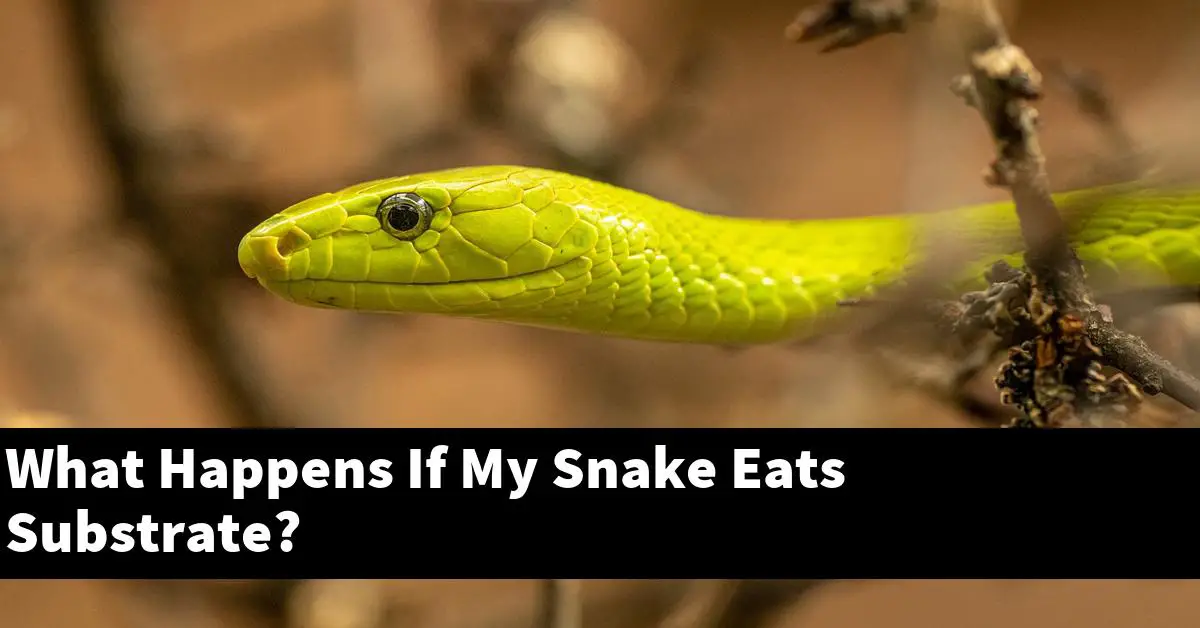If your snake eats substrate, there could be a number of different consequences. Some snakes may be able to digest the substrate without any problems, while others may experience digestive issues or blockages. If you’re concerned about your snake eating substrate, it’s best to consult with a veterinarian or reptile specialist.
If your snake eats substrate, they may suffer from impaction, which is when the substrate collects in their digestive tract and prevents them from digesting their food properly. This can lead to weight loss, dehydration, and eventually death.
The article will be discussing what could happen if a snake eats substrate, as well as what kind of substrate is safe for snakes to eat.
Table of Contents
What are the health risks associated with a snake eating substrate?
When a snake eats substrate, there are a few health risks that are associated with it. The first is that the snake could choke on the substrate. If the substrate is small enough, it could lodge in the snake’s throat and block the airway. This could cause the snake to suffocate.
Another health risk associated with a snake eating substrate is gastrointestinal blockage. This happens when the substrate is too large to be digested properly and gets stuck in the snake’s digestive tract. This can cause a lot of discomfort for the snake and may even lead to death if not treated promptly.
Lastly, substrate can also contain harmful bacteria or toxins that can make the snake sick. This is why it’s important to only use substrates that are safe for snakes and to clean the substrate regularly.
What are the consequences of a snake eating substrate?
If a snake ingests substrate, the consequences can be severe. The substrate can cause digestive blockages, and may even puncture the snake’s intestines.
In some cases, the snake may regurgitate the substrate, which can lead to further health complications. If the snake continues to eat substrate, it may eventually die.
How can I prevent my snake from eating substrate?
One way to prevent your snake from eating substrate is to provide a bowl of water for it to soak in. This will help to keep its skin hydrated and will also make it less likely to eat the substrate.
Another way to prevent your snake from eating substrate is to provide it with a diet that is high in protein and low in fat. This will help to keep your snake healthy and will also make it less likely to eat the substrate.
Is it okay if my snake eats coconut substrate?
It is okay if your snake eats coconut substrate. Coconut substrate is a great source of nutrients for your snake.
It is high in fiber and helps to keep your snake’s digestive system healthy. Coconut substrate also contains essential fatty acids that are beneficial for your snake’s skin and coat.
How do you get the dirt out of a snake’s mouth?
If you have a snake that has gotten dirt in its mouth, you will need to clean it out. The best way to do this is to use a cotton swab or a soft toothbrush.
Gently scrub the inside of the snake’s mouth, being careful not to hurt the snake. You may need to do this a few times to get all the dirt out.
What happens if my snake tries to eat something too big?
If your snake tries to eat something that is too big, it is possible that they will regurgitate the item. If the item is too large, it could cause your snake to block their airway and they could suffocate. If you think your snake has eaten something too big, it is important to take them to the vet as soon as possible.
Summary
There are a few things that could happen if your snake eats substrate. The substrate could become lodged in your snake’s digestive tract, which could lead to an obstruction.
If the substrate is sharp, it could also cause internal bleeding. If your snake ingests a toxic substrate, it could lead to poisoning. If you’re concerned that your snake has eaten substrate, take it to the vet for an examination.


